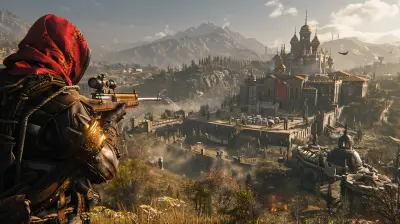The Role of Voice Actors in Making Iconic Game Characters Come to Life
22 September 2025
Voice acting in video games: it’s one of those things that’s easy to overlook but impossible to forget once it leaves its mark. You might not even realize it until you replay your favorite title, but those iconic lines and memorable personalities are thanks to the magic of voice actors. Whether it’s the gravelly tone of a battle-hardened warrior, the comedic banter of a quirky companion, or even the chilling monologue of a villain, voice actors breathe life into the polygons and pixels on your screen.
Think about it—what would The Last of Us be without Troy Baker’s Joel, or how much personality would Mass Effect retain without Jennifer Hale’s performance as Commander Shepard? Voice actors are, quite literally, the soul of gaming’s most cherished characters. Without them, these characters would just be moving models with no heart or depth. Let’s dive into why voice actors are simply irreplaceable in creating iconic game characters.![]()
The Unsung Heroes: Voice Actors as Storytellers
Voice actors are the hidden storytellers of the gaming world. Sure, we love a good script, and developers deserve the spotlight for designing expansive worlds, but take away the voice and what’s left? Probably a husk of a character. A skilled voice actor doesn’t just speak lines—they own the character. Whether it’s conveying raw emotion, subtle sarcasm, or heart-wrenching vulnerability, they make us care.Remember when Arthur Morgan from Red Dead Redemption 2 muttered, "I gave you all I had"? That scene wouldn’t have hit so hard without Roger Clark’s performance. His voice cracked with the weight of despair and loyalty—it was pure storytelling. Voice acting transforms dialogue from mere text into something visceral.![]()
Adding Depth and Personality to Game Characters
Let’s be real: voice actors make characters unforgettable. A well-designed character might catch your eye, but a well-voiced character will live in your head rent-free. Why? Because voice work adds depth, personality, and even quirks that aren’t always in the script.Take Claptrap from Borderlands. On paper, he’s just a cranky robot. But David Eddings’ eccentric and borderline obnoxious delivery turned Claptrap into the comedy relief we didn’t know we needed. Similarly, think of GLaDOS from Portal. Without Ellen McLain’s stark mix of deadpan humor and unsettling menace, GLaDOS wouldn’t be half the icon she is. Their voices gave these characters dimension, making them more than just “robotic sidekicks.”![]()
Emotional Connection: The Heart of Memorable Performances
Have you ever cried over a video game? (Don’t worry, no one’s judging.) That’s the result of great storytelling and exceptional voice acting. The right voice performance makes you feel something—a connection that sticks.Take the father-daughter dynamic of Joel and Ellie in The Last of Us. You can hear Joel’s guarded toughness soften as he warms up to Ellie. Ashley Johnson’s portrayal of Ellie, with her mix of youthful sass and vulnerability, makes you root for her every step of the way. These relationships wouldn’t resonate if the voice actors didn’t pour their hearts into them.
Voice actors are like emotional architects. They help build those connections with players. Can you imagine God of War’s Kratos without Christopher Judge’s thunderous, commanding voice? His stoic delivery layered with tender moments made us see Kratos as more than just an angry Spartan—he became a grieving father trying to do right by his son.![]()
World Immersion: Voices That Complete the Atmosphere
Imagine playing an open-world RPG, running through fields, fighting monsters, and interacting with NPCs. Good graphics and gameplay mechanics might pull you in, but voices keep you there. Voice actors help to immerse us in these fictional worlds, making them feel alive.Games like The Elder Scrolls V: Skyrim owe much of their immersive quality to voice acting. Sure, there’s a meme about hearing the same five voices across the entire game, but those voices still lend NPCs enough personality to make them feel like real inhabitants of Tamriel.
And it’s not just NPCs. Protagonists like Nathan Drake (Uncharted) or Lara Croft (Tomb Raider) carry us through their games. Their banter, inner monologues, and reactions bring life to the world around them. Nolan North’s casual charm as Nathan Drake makes you feel like you’re on a treasure-hunting adventure with your best friend.
The Challenges That Voice Actors Face
It’s not all glitz and glamour for voice actors. Behind the scenes, it’s hard work. Voice acting is more than just reading lines—it involves conveying emotion with just your voice, sometimes for hours on end, in a sound booth. And let’s not forget about the physical toll. Screaming, growling, or mimicking combat noises can strain the vocal cords.On top of that, voice actors often face job insecurity and low pay, despite their importance in the gaming world. It’s only recently that their contributions have been recognized as critical to a game’s success. Movements like #PerformanceMatters have shed light on these challenges, pushing for better working conditions and compensation for voice talent.
Motion Capture and Voice Acting: The Perfect Pair
These days, many voice actors pull double duty as motion capture performers. Mo-cap merges voice acting with physical performance, creating more authentic and nuanced characters. Think of performances like Andy Serkis’ Gollum in The Lord of the Rings movies—gaming has adopted a similar synergy.In games like Death Stranding or The Last of Us Part II, the characters’ physical movements and facial expressions are synchronized with the actors' voices, giving them an extra layer of realism. That’s why you can almost feel Sam Porter Bridges’ (Norman Reedus) exhaustion after a long trek in Death Stranding. Motion capture combined with voice acting turns these characters into something truly human.
Fan-Favorite Voice Actors: The Real Icons Behind the Scenes
Some voice actors have become legends in their own right, amassing fan followings that rival the characters they portray. Names like Troy Baker, Laura Bailey, Nolan North, and Jennifer Hale are synonymous with iconic roles. These are the people we trust to bring our favorite characters to life, time and time again.Why? Because they get it. They understand the nuance, the emotion, and the passion gamers have for these characters. When you hear Tara Strong voice Harley Quinn or hear Charles Martinet’s iconic "Wahoo!" as Mario, it’s like catching up with an old friend.
The Future of Voice Acting in Gaming
With gaming technology advancing faster than ever, the role of voice actors is only becoming more integral. AI-generated voices are creeping into the industry, but let’s be honest: can an algorithm replicate the spark of a human voice? Unlikely.Gamers crave authenticity. We want characters who feel real, who evoke emotion, and who stay with us long after we’ve completed the game. Voice actors aren’t just a luxury—they’re a necessity in creating these experiences. And as games continue to push boundaries, voice actors will remain at the forefront, shaping the way we connect with our favorite medium.
Conclusion
Voice actors are the beating heart of gaming’s most iconic characters. From adding emotional depth to creating immersive worlds, they do so much more than just “read lines.” They’re storytellers, performers, and sometimes the cornerstone of a game’s success. Without them, the characters we love would simply be lifeless shells.So the next time you’re yelling at an NPC for bad quest directions or laughing at your companion’s silly quips, take a moment to appreciate the voice actor behind it. Because at the end of the day, they’re the ones who make our favorite gaming memories unforgettable.
all images in this post were generated using AI tools
Category:
Gaming CultureAuthor:

Francesca West
Discussion
rate this article
1 comments
Nicholas McKee
Voice actors shape characters' emotional depth, enhancing player engagement and storytelling.
September 23, 2025 at 4:52 PM

Francesca West
Absolutely! Voice actors play a crucial role in bringing characters to life, deepening emotional connections and enriching the overall narrative experience for players.


